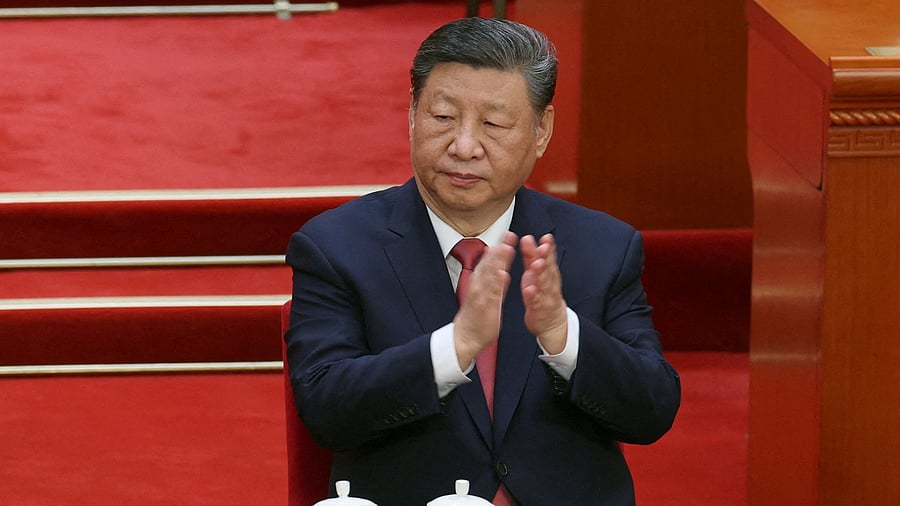
Chinese President Xi Jinping
Credit: Reuters File Photo
On the sidelines of the recently wrapped-up annual sessions of China’s legislative and consultative bodies, China’s Foreign Minister Wang Yi held the customary press conference outlining China’s positions on major global issues and foreign policy directions. Among many things, Wang’s emphasis on the ‘Global South’ figured at the top. The term ‘Global South’ featured 22 times, followed by references to the United States, and global order. The fact that three terms figured multiple times, often together, is no coincidence.
Wang’s emphasis that the Global South “should stand together in unity” and “speak in one voice” at the global level underlines China’s efforts to reposition the idea of the Global South in the rapidly changing global geopolitical landscape, and its own leading status within that framework. These efforts to project China’s identity as a Global South country and the idea that these countries need solidarity are emerging as one of the key features of its strategy to deal with geostrategic competition with the US.
Moreover, using a Chinese metaphor 风起云涌 (‘storm is coming’) from a poem by 10th-century Chinese poet to describe the nature of geopolitical changes, Wang underlined the emerging view among policymakers that it is an opportune strategic moment to project China’s leading status within the Global South and using it as a platform for its interests.
Shifts in China’s views of Global South
The developing world has always been one of the focuses of Chinese foreign policies since the founding of the People's Republic of China in 1949. Its centrality waned to some extent post-1978 economic reforms, and its recalibration of ties with the US and the Western world in the 1970s and 1980s. It gained its significance first economically and then strategically in the 21st century.
As a result, over two decades since then, it has enmeshed itself in a web of multilateral institutions; with its expansion in 2024, BRICS is a prime example of emerging as an institutional platform for China to project its status and influence in rallying the developing world behind its agenda.
However, the idea of the Global South has become much more significant in China's global strategy in more recent times. The idea of solidarity or unity among Global South countries has been used by Chinese leaders within platforms like the BRICS and SCO as they have started to emphasise their expansion and more significant role in global governance.
These aspirations that the Global South can be a credible bulwark against economic and geopolitical disruptions have also been subtly articulated in official statements. Consider, for example, Chinese President Xi Jinping's call for greater co-ordination among BRICS nations on global geopolitical issues such as the Hamas-Israel conflict in his speech at the BRICS extraordinary virtual summit on the Palestinian-Israeli issue in November 2023.
China’s dubious Global South identity
Despite its arduous efforts, China’s identity as a Global South or developing country is in question. In terms of per capita income, China is a middle-income country, and in terms of GDP, it ranks second in the world. Thus, economically, it shares little in common with most developing countries.
China has often banded together with developing countries on climate change and trade negotiations, highlighting its status as a developing country. That way, its developing country status is helpful to evade committing formal obligations. However, geopolitically, it recognises the challenge of the identity disconnect between its geopolitical and economic status.
Wang subtly addressed this while stating that China shares commonality with these countries in terms of the shared history of fighting against colonialism. At the same time, he reiterated the idea of commitment to shared development and prosperity, in a way, acknowledging the economic disconnect with the developing world and its policy priorities and objectives at the global level.
Thus, Wang’s choice of the annual sessions as a platform to articulate the centrality of the Global South in China’s global strategy is an indication that Chinese policymakers see rallying Global South countries behind it as a key strategy in its efforts to cope with geopolitical competition with the US and consequent economic challenges.
For India and other countries that view Global South institutions, like the BRICS, as a neutral platform, China’s emerging strategy poses diplomatic challenges in balancing their choices and strategies, and preventing China’s efforts to dominate the geopolitical agenda of these institutions.
The sheer economic predominance allows China to back its intentions with material resources. Given the increasing propensity of Chinese policymakers to assertively use its economic might for geopolitical influence, Wang’s suggestion for dragon-elephant dancing together to democratise the international system is a mere smokescreen for stressing its commonality with the Global South than a statement of real intent for equal partnership. Thus, China’s push for appropriating the voice of the Global South affects India’s efforts to lead the amorphous grouping.
Devendra Kumar is an Associate Fellow at the Centre of Excellence for Himalayan Studies, Shiv Nadar Institution of Eminence, Delhi NCR.
Disclaimer: The views expressed above are the author's own. They do not necessarily reflect the views of DH.